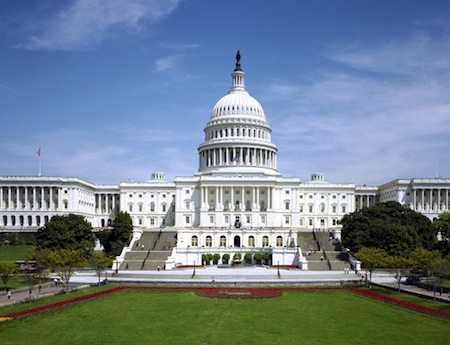House Weighs into 'Historic' Big Tech Antitrust Bills
Markup reveals Republican divide over legislation

The smarter way to stay on top of the multichannel video marketplace. Sign up below.
You are now subscribed
Your newsletter sign-up was successful
The House Judiciary Committee Wednesday (June 23) began marking up a host of Big Tech-targeted antitrust bills that tech companies have labeled a threat to freedom of speech and an existential threat to U.S. competitiveness.
The package includes over a half dozen bills, including one whose name suggests why Big Tech is worried: "The Ending Platform Monopolies Act." That bill would, for example, disallow Amazon from selling its own products in competition to third parties using its marketplace, or prevent Google from favoring certain content in search results.
Also Read: Big Tech Asks Hill to Delay Antitrust Bill Markup
The Platform Competition and Opportunity Act of 2021, which would prohibit the purchase by a Big Tech platform of any other business unless it could prove that it is not purchasing a direct competitor.
The bills would give Federal Trade Commission and Justice Department more tools--and money through boosted merger fees--to oversee antitrust oversight of Big Tech.
But while the Democrats billed the bills as "historic, bipartisan legislation" necessary to rein in Big Tech abuses, Republicans were divided over their potential effectiveness and how much power regulatory and enforcement, they gave the government.
Even one of the bill's co-sponsors said he was now conflicted over how the new antitrust power the FTC and Justice got would be used.
Also Read: Hill Ponders Tougher Antitrust Stance on Big Tech
Still, the fact that there is some Republican support suggests some or all of the bills might actually make it into law, which is probably why tech associations are pushing back so hard and talking in near apocalyptic terms about that prospect.
Committee chair Jerry Nadler (D-N.Y.) said one of the failures of the Telecommunications Act was that it did not check consolidation of the major communications players, first ISPs and now online platforms.
Ranking member Rep. Jim Jordan (R-Ohio) said the key for Republicans was whether Democrats want to stop censorship of conservative speech online, including that of former President Donald Trump, then made it clear he did not think that would be the result.
Jordan argued that the bills don't break up big tech or stop censorship. Among other things, he said, the bills would give too much power to the FTC, which is now run by Lina Khan, a former staffer to the House Judiciary Democrats.
Jordan said the bills are about Big Tech and Big Government "marrying up and working together" to keep information from the American people.
There may be some things in the bills that are OK, he said, but as a package, they don't solve the problems that Republicans have with Silicon Valley.
Rep. David Cicciline (D-R.I.), chairman of the Antitrust Subcommittee, said the digital marketplace suffers from a lack of competition and that dominant platforms Facebook, Google, Amazon and Apple, abuse that monopoly power with predatory behavior including disadvantaging competitors, including by burying or buying them.
He said the unregulated tech monopolies want nothing to change, but that America "has had enough" and Congress must curb their dominance. He said the bills were the beginning of that process.
Rep. Ken Buck (R-Colo.), ranking member of the Antitrust Subcommittee, clearly disagreed with the Jordan, the ranking member of the full committee. Buck strongly supported the bills and said they were, indeed, bipartisan. He said the legislation was a scalpel, not a chain saw, but that they would hold Big Tech accountable by dealing with the most important aspects of antitrust reform.
He said the bills, which were introduced earlier this month, were the culmination of am 18-month bipartisan investigation into the monopoly power of Big Tech to "routinely use their gatekeeper power to crush competitors, harm innovation, distort and destroy the free market and silence conservatives."
The Computer & Communications Industry Association, whose members include the major platform players, weighed in in advance of the hearing, saying the bills were anti-consumer for "singling out a handful of popular, consumer-centric businesses."
“These bills would harm consumers and thousands of smaller businesses that use digital services to reach worldwide markets," said CCIA president Matt Schruers. They put the U.S. economy and the U.S. position as a leader in innovation at risk. Instead of boosting U.S. innovation to compete with threats from abroad...these bills would disincentivize innovation by affording foreign rivals a free ride on a few U.S. companies’ R&D investments.”
The markup was turning into a marathon at press time. It took almost three hours before the first bill, which increased merger fees, passed on a bipartisan vote 29 to 12.
The smarter way to stay on top of the multichannel video marketplace. Sign up below.
Contributing editor John Eggerton has been an editor and/or writer on media regulation, legislation and policy for over four decades, including covering the FCC, FTC, Congress, the major media trade associations, and the federal courts. In addition to Multichannel News and Broadcasting + Cable, his work has appeared in Radio World, TV Technology, TV Fax, This Week in Consumer Electronics, Variety and the Encyclopedia Britannica.

